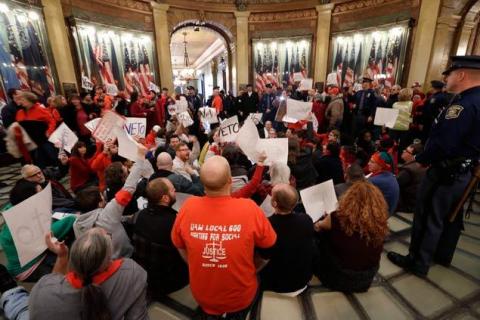A divided federal appeals court released a ruling Thursday that lets Michigan public schools stop collecting union dues under a law approved last year.
In a 2-1 ruling, U.S. Sixth Circuit Court of Appeals Judge Raymond Kethledge — a Troy lawyer named to the bench in 2008 by President George W. Bush — said the law banning payroll deduction of dues for public school employees didn't violate the U.S. Constitution.
He rejected arguments by four unions representing Michigan school employees that the failure to collect dues violated the First Amendment right to speech by teachers' unions.
The ruling reverses a June 2012 preliminary injunction by Detroit federal judge Denise Page Hood prohibiting Public Act 53 from taking effect.
The Sixth Circuit reviews appeals from the federal district courts in Michigan, Ohio, Kentucky and Tennessee. Kethledge also was counsel to Republican former U.S. Sen. Spencer Abraham of Michigan and an attorney for Ford Motor Co.
Kethledge, a former law clerk to U.S. Supreme Court Justice Anthony Kennedy, also dismissed an argument that the law approved by the GOP-controlled Legislature wasn't legal because it singles out public school unions — and no other public-sector unions — for the ban on collecting union dues.
"Public Act 53 does not restrict the unions' speech at all: they remain free to speak about whatever they wish," Kethledge wrote in an opinion joined by Judge Julia Smith Gibbons, another Bush appointee, citing a 2009 U.S. Supreme Court case as a precedent.
"…the Act merely directs one kind of public employer to use its resources for its core mission rather than for the collection of union dues," he added.
The ruling was welcomed by Michigan Freedom Fund, a statewide group that supports the right-to-work law and reforms of public-sector unions.
"For years, one-percenter union bosses fleeced taxpayers and took money out of the public school classroom to finance their internal dues collection efforts," Freedom Fund President Greg McNeilly said Thursday. "Today's decision means a little less frustration for parents and teachers alike who have been understandably tired of seeing tax dollars spent on union business instead of our kids."
In a dissent, Judge Jane Branstetter Stranch, named to the bench by President Barack Obama, said laws must be viewpoint neutral on speech. That requirement "means little if a state may legislate with impunity to cripple the power of an unpopular group whose political views are objectionable to the state," she said.
Stranch noted the House Fiscal Agency found the law would have "no significant fiscal impact on school districts" — and said Republicans offered no evidence the law would save money for school districts.
Stranch also questioned the GOP argument that the bill would boost union accountability and questioned why it wasn't extended to police, firefighter and other public-sector unions.
"Michigan's failure to similarly promote the accountability of those employees' unions suggests that Act 53 targets teachers because the state disagrees with their point of view," she wrote.
The Michigan Education Association, the state's largest teacher and school employee union, said it considering whether to appeal the decision.
"We are disappointed in the Sixth Circuit's decision in this case and believe the dissenting opinion most accurately portrays the law in this case," MEA President Steve Cook said in a statement. "Banning payroll deduction of dues only for school employees is clearly an attack on the First Amendment rights of our members and retaliation for our activism in fighting the right-wing, anti-public education agenda."
Many private companies don't deduct union dues from employees' paychecks in Michigan and across the country.
Republicans in the state Legislature and teachers' unions in Michigan have clashed in recent years over school governance, pensions and other funding issues.


Spread the word